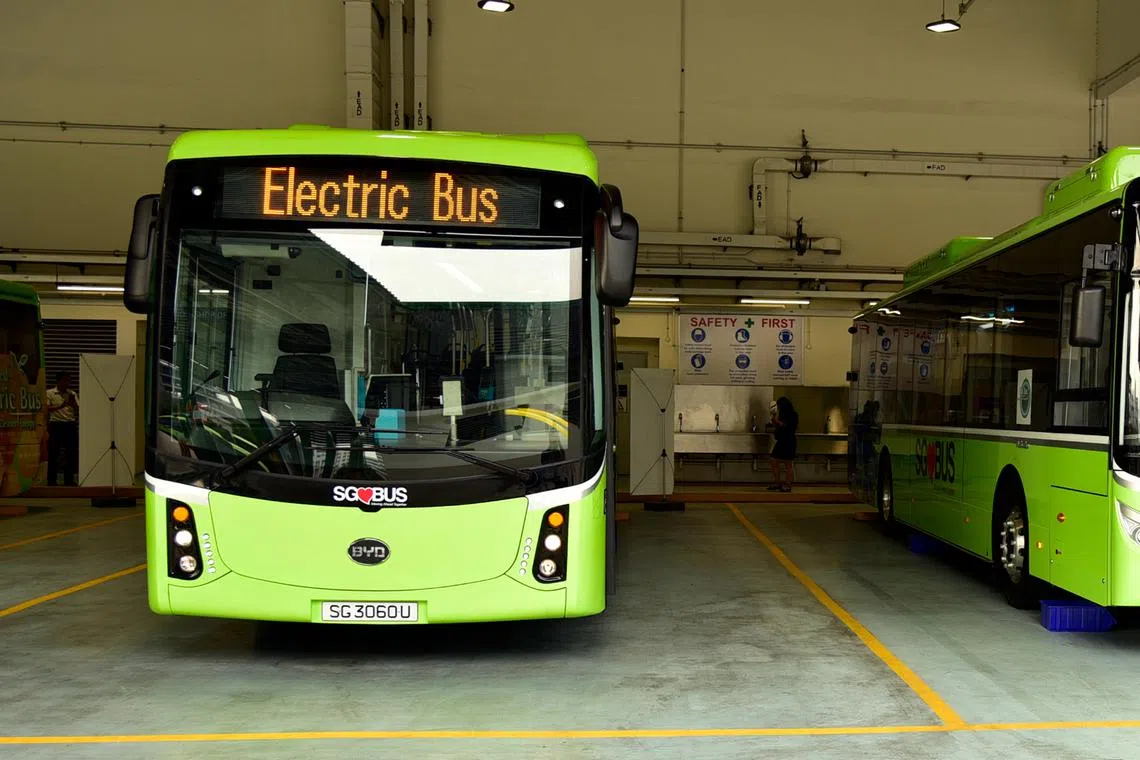Tender called for 400 electric buses in the largest purchase of its kind by LTA
Sign up now: Get ST's newsletters delivered to your inbox

Over the past two years, LTA has been trialling single-deck electric buses made to local specifications from Chinese manufacturers.
PHOTO: ST FILE
SINGAPORE - Around 400 new electric single-deck buses will go on the roads here from December 2024, in the largest procurement contract of its kind by the Land Transport Authority (LTA) as it begins to overhaul Singapore’s fleet of public buses so that half of them run on batteries.
A tender for the electric buses was called on March 27, along with a separate tender to install chargers at four future bus depots and two upcoming integrated transport hubs (ITHs).
The four depots are in Sengkang West, Gali Batu, East Coast and Kim Chuan.
Construction of the first two bus depots is expected to be completed around 2024, in time to receive the first of the 400 new electric buses.
The East Coast and Kim Chuan depots are expected to be completed in 2025 and 2026, respectively.
Meanwhile, the two upcoming ITHs that will get chargers for electric buses are in Punggol Coast, where a new MRT station is expected to be operational in 2024, and Pasir Ris, which is expected to be ready some time in 2028.
ITHs are fully air-conditioned bus interchanges that are linked to MRT stations and nearby commercial developments such as shopping malls.
In response to queries, LTA said the chargers are needed to support the growing fleet of electric buses in Singapore over the next few years.
There are currently 32 plug-in charging stations at the Bulim, Seletar and Loyang bus depots, as well as four overhead pantograph chargers at ITHs in Bukit Panjang and Bedok.
These were installed to support the initial roll-out of 60 electric buses that were bought in 2018 and put into service from 2020 under a pilot scheme.
LTA said the initial trial allowed it to glean operational and technical insights in areas such as maintenance, charging needs and range considerations.
This, alongside working with the industry, gave the authority confidence to accelerate its efforts to go electric.
The 400 new electric vehicles that LTA is looking to buy will replace diesel-powered buses that are nearing the end of their 17-year statutory lifespan.
According to tender documents, the new electric buses must be single-deck, have three doors and a low-floor interior design with two wheelchair bays.
The operating range of the buses must be at least 280km, and they must use plug-in chargers, with an option for an additional on-board pantograph charging system.
LTA also indicated in the tender a preference for suppliers that have local after-sales support, to encourage skills and technology transfer to workers and companies here.
According to the documents, the first new buses will be delivered in October 2024, with the last batch to be delivered in October 2025.
Prior to calling the March 27 tender, which it intends to award in the second half of 2023, LTA said it had already engaged potential suppliers on the specifications.
“We are confident that there will be sufficient suppliers for the tender to be competitive,” it said.
Over the past two years, LTA has been trialling single-deck electric buses made to local specifications from Chinese manufacturers BYD, CRRC and Zhongtong.
The locally assembled Volvo BZL-SC Neustar City electric bus, which made its debut in November 2022, also started plying the service 990 route on March 26 to test its real-world performance.
Moving forward, LTA said its public bus purchases will primarily be battery-powered models, with the aim of having half the public bus fleet here electric by 2030.
As at end-2022, there were 5,847 public buses, the majority of which run on diesel.
National University of Singapore associate professor Raymond Ong said more electric bus tenders of similar or even larger sizes can be expected in the future as LTA renews the public bus fleet.
LTA has likely chosen to buy only single-deck electric buses this time around because the new vehicles are directly replacing their single-deck diesel counterparts, said Prof Ong, who researches transport infrastructure.
He added that it would also be easier for bus operators to deploy single-deck buses across different routes, as there are fewer restrictions on factors like turning radius as compared with double-deckers.
According to LTA’s initial trial, electric buses have reduced emissions by 50 per cent compared with diesel buses, after taking into account emissions generated by the power grid, and saved 50 per cent in fuel costs on a per-km basis.
Electric buses will significantly improve the air quality of Singapore’s streets as they do not emit fumes, said Prof Ong. They are also much quieter, he added.



